Eurisy Shaping Europe’s Future at the 16th European Space Conference
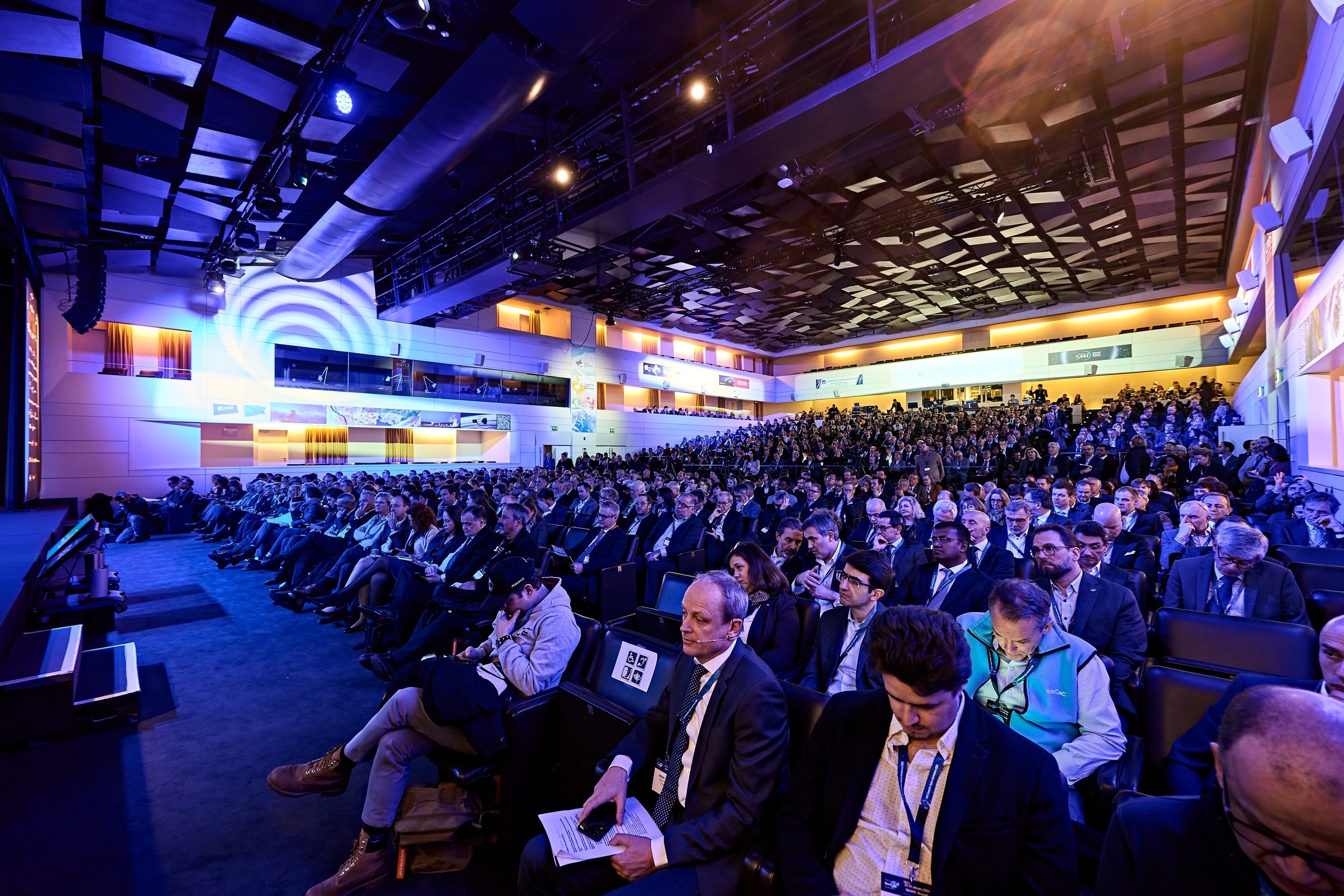
Eurisy at the 16th European Space Conference: Shape Europe’s Future
The 16th European Space Conference, ‘Shape Europe’s Future’, took place on January 23 and 24, gathering relevant actors from the space sector, to meet and exchange on the future of the space sector in Europe. Conducted under the auspices of the Belgian Presidency of the Council of the European Union, the conference brought together more than 1,000 participants at the SQUARE Convention Centre in the heart of Brussels. In between heads of space agencies, industry leaders, politicians, researchers, SMEs, and students, Eurisy could not miss the opportunity to showcase its work and animate two sessions on the use of satellite solutions by European regions and the development of skills for the downstream space ecosystem.

© Business Bridge – European Space Conference 2024
Eurisy’s booth was the place where curious minds could come and exchange with the team and discover more on the association and on our missions. The most adventurous ones took their chance and tried the Space Service Hub, Eurisy’s virtual reality experience. Users were able to discover the impact of satellite-enabled solutions on our daily life by traveling around three specific areas – a smart city, a coastal, and a rural area. Catch a glimpse of this adventure on our website: https://www.eurisy.eu/space-service-hub/
The Village Stage was animated by a variety of talks and breakthroughs, aimed at promoting innovative initiatives and expanding the horizon of the space conference. Topics varied from the interconnections between ocean and space, to the role of communication in the space sector, from satellite applications to monitor deforestation, to skills. Three panel discussions were organised on the Village Stage, including two moderated by Eurisy’s Secretary General, Ms Annalisa Donati.
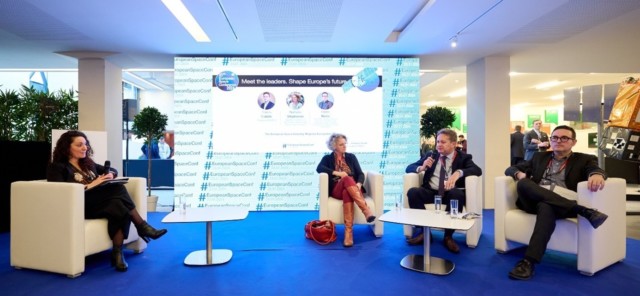
© Business Bridge – European Space Conference 2024
The European Space Industry Regions Ecosystem session, featured Dr Nathalie Stéphenne, working at the Walloon Public Service and in charge of the WalOUS project, Mr Thierry Cotelle, President of the Network of European Regions Using Space Technologies (NEREUS), as well as Mr Pedro Narro, Policy Officer for Climate, Energy and Green Deal at the European Committee of the Regions. The crucial role of local legislations on disaster risk management, has been fully appreciated though the demonstration of WalOUS. This initiative enabled the creation of high-resolution land-use and land-cover maps of the Walloon region, based on an analysis of business needs and in compliance with regional and European standards. Ms Stéphenne described the key building blocks of the project as: 1) gathering groups of users to collect technical specifications for co-creation purposes; 2) proceeding to land cover and uses data collection and combine results with users data to create the map; 3) updating the map continuously and consolidating the analysis of the needs to provide actionable information to the different services of the Regional administration and facilitate decision-making at the local level.
Regions have a key role to play to mitigate climate change effects and develop evidence-based adaptation strategies and policies to increase resilience for an effective, more sustainable use of the territory. Mr Narro highlighted the need to raise awareness among local administrators on the benefits deriving from the integration of such information in a seamless knowledge infrastructure to fully exploit the possibilities offered. Mr Cotelle in his capacity of Governor of the Occitane region in France shared his experience and the several activities initiated to advocate for a larger understanding while ensuring access to training to up and re-skill personnel.
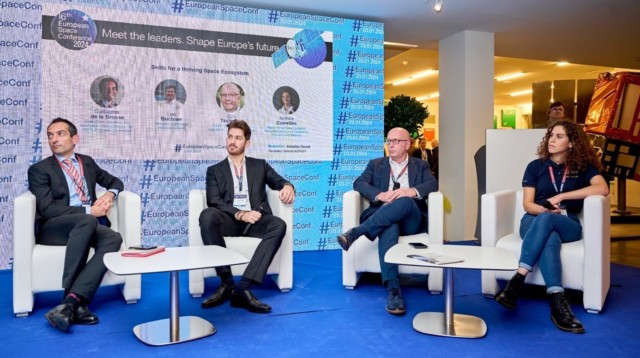
© Business Bridge – European Space Conference 2024
The spotlight was also put on skills development and education, with a panel discussion on Skills for a Thriving Space Ecosystem. The diversity of the panel highlighted the necessity of having a multidisciplinary approach to the space sector to address the gap between the sector’s needs and the skills shortage. Mr Guillaume de La Brosse, Head of Unit of Innovation and New Space – Space Defence at the European Commission DG-DEFIS, Mr Leo Buchner, President of the Association EUROAVIA, Mr Eric Tschirhart, Special Advisor to the Rector at UNIVERSEH ‘European University’, and Ms Anthea E. Comellini, Guidance, Navigation and Control Engineer and ESA Reserve Astronaut discussed how skills are shaping the future of the space sector and vice-versa under the guidance of Ms. Annalisa Donati. As the space ecosystem evolves at a fast and increasing pace, the industry is finding it harder to employ skilled professionals, especially as current curricula are evolving at a paradoxical slow pace. One major takeaway from the session is the need for increased multidisciplinarity and forward thinking in the space ecosystem, which could be achieved through deeper collaboration with industry and academia, and perhaps through jointly defined curricula. It is worth mentioning that the space sector is not lacking in aerospace engineers, it is lacking specific skills outside the traditional programs, and especially software skills and soft skills. In light of these challenges, Mr Guillaume de La Brosse announced two initiatives carried on by DG DEFIS to help bridge this gap:
- Job Placement schemes: to support students and young graduates in finding internships and job opportunities in local space companies;
- CASSINI Space summer camps: to inspire young people from 14 to 18 to pursue a career in the space sector.
The Commission has launched a survey to gather first-hand insights from industry and academia to ensure an efficient design of the Job Placement scheme. Participate to the online survey: https://ec.europa.eu/eusurvey/runner/Skills4EUSpace
The session concluded that it is essential to educate younger generations about the accessibility, needs and opportunities of the space sector. This is particularly true for girls and young women who are often discouraged from pursuing scientific and technical careers. Skills are present in everyone. It is crucial to teach children that they can dream and that the space sector is accessible.
All the stages have been animated by insightful talks analysing from different angles the current state of the European space sector, future challenges, and possible pathways to ensure its sustainability, including the European Union Space Law (EUSL), the increased uses of space and the potential of space-based applications. As a concrete step towards empowering the European space sector, Commissioner Thierry Breton announced that a first draft of the EUSL, envisioned as the first all-encompassing European space law, will be presented by the European Commission by March 2024. Promoting a unified and collaborative approach, EUSL is intended to safeguard safety, resilience, and sustainability of the European space sector. Noteworthily, EU Institutions demonstrated a strong commitment to empowering the private space sector and acting as an anchor customer. This position was clearly announced by Commissioner Thierry Breton during his introductory speech and presentation of the content of EUSL. The issue of access to investment and funding was a recurring topic during the conference, especially because of the increasing gap between Europe and the United States in private and public investment in the space sector that prevents numerous start-ups to thrive in Europe. Conceived as a tool to help bridge this gap, the European Union Space Law aims to improve the competitiveness of the EU by providing a common legal framework that will reduce internal competition and consolidate the EU’s strengths to make it a global competitor and redirect public and private investments.
In accordance with this momentum, the European Space Agency, the European Commission and the European Investment Bank signed a landmark agreement to strengthen their collaboration and enhance the European space sector. This cooperation is set to rely on three main domains:
- Identification and support of European space projects.
- Boost of exchange of best practices in public-private partnership models for space initiatives.
- The Space Finance Labs Workshop to unite EU space stakeholders and address funding challenges.
This tripartite agreement shows the willingness of major space actors to further investments and actions within the European space sector.
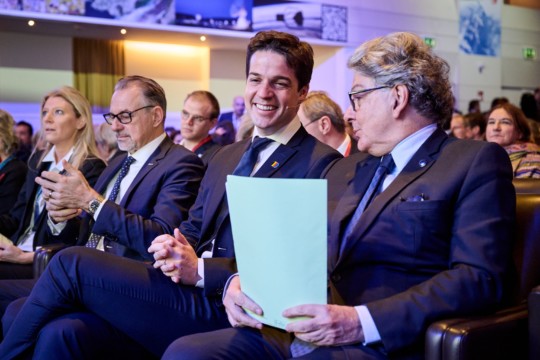 From left to right: Josef Aschbacher, ESA Director General, Thomas Dermine, Belgium State Secretary for Science Policy, Recovery Program and Strategic Investments, Thierry Breton, Commissioner for Internal Market at the European Commission. © Business Bridge – European Space Conference 2024
From left to right: Josef Aschbacher, ESA Director General, Thomas Dermine, Belgium State Secretary for Science Policy, Recovery Program and Strategic Investments, Thierry Breton, Commissioner for Internal Market at the European Commission. © Business Bridge – European Space Conference 2024
Europe’s future vision, at the heart of this year’s conference, was presented by Commissioner Thierry Breton. He introduced five interconnected pillars to guide Europe’s action:
- Creating a true EU Single Market for space, especially by providing a common legal framework to EU member States with the incoming European Union Space Law (EUSL).
- Establishing an independent European access to space by transforming the launcher policy, allowing more transparency, and financially supporting Europe space capabilities through investment.
- Protecting EU space systems through new capacities by reinforcing the current EU SST consortium by developing a European ‘Space Domain Awareness’ system to protect infrastructures and monitor threats, and by fostering Europe’s capacity to act in Space.
- Unlocking the potential of EU space programmes for defence and boost new services in support of security and defence, such as Galileo’s Public Regulated Service (PRS), IRIS2, EU EO governmental service.
- Ensuring the prosper commercialisation of space through New Space.
These five pillars animated the debates and discussions within the conference’s panels afterwards, but they were not the only recurring themes.
Independence, sustainability, cooperation, and security were the driving subject matter of the conference and were addressed as the main components of the future of Europe, and as key ingredients to ensure a competitive European space sector, with a well-assumed margin of progress from all actors. These topics underlined many discussions such as the Conversations with Heads of Agencies on their Views on the Future of Space Policy, Economic Security and Autonomy, or the discussion on Defining the European Approach to Secure and Autonomous Connectivity from Space, or the panel on Ensuring the Development of a European Ecosystem for Autonomous and Strategic Access to Space. In line with the IRIS2 Secure Connectivity Programme that was announced in 2023, Director for Secure and Connected Space at EC DG-DEFIS Ekaterini Kavvada reaffirmed the necessity and will of the EU to ensure safe and resilient communications to governments, citizens, and -remarkably- to the military. Answering to pressing security concerns due to multiplying cyber and hybrid threats, the IRIS2 constellation has been conceived following a “dual-use by design” approach and will provide secure communications to European armies and support space surveillance from space. As the last step of the procedure of IRIS2 is ongoing, Commissioner Thierry Breton announced that the EU will be in a position to sign one of the biggest space contract of its history by Easter this year. The IRIS2 programme aligns seamlessly with the vision that guided the creation of the 2023 EU Space Strategy for Security and Defence and emphasized the necessity to enhance the integration between space capabilities and the Union’s security and defence mechanisms and materializes this necessity. Acknowledging these growing links and the need to address them in civilian fora, the Conference directly approached space security concerns through the military lens and dedicated two distinctive panels to the topic with unequivocal titles: Navigating the Increasing Links between Space and Defence, and In Conversation with Space Commanders. Both discussions emphasized the importance of cooperation and solidarity between the military and civil society, as well as the need for a shared strategic culture to ensure preparedness and resilience. Indeed, the space industry can only thrive if it is safe, but civilian capabilities can also support defence purposes, as IRIS2 illustrates.
One of the most significant events related to the Conference took place after the closure of the main stages, when Ms Hadja Lahbib, Belgium’s Minister of Foreign Affairs, and Mr Thomas Dermine, Beligum State Secretary for Science Policy, Recovery Program and Strategic Investments, signed the Artemis Accord on behalf of the Belgian Government. Belgium reaffirmed its wish to make space one of the inexorable priorities of its mandate as President of the Council of the European Union.
The upbeat rhythm of the Conference set the tone for the take-off of 2024, and European space actors will have to follow the pace throughout this year, and for the ones to come.
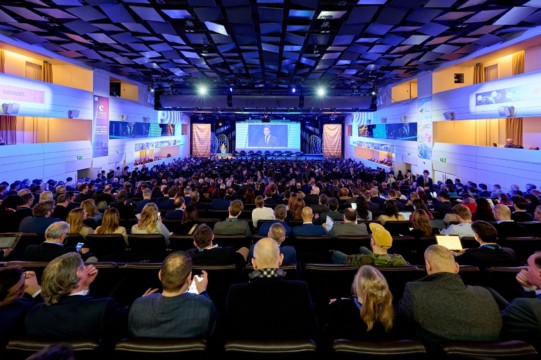
© Business Bridge – European Space Conference 2024
